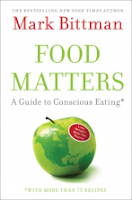Saturday, January 23, 2010
Losing my religion
Friday, November 27, 2009
Perfect timing
Saturday, October 17, 2009
Meating my life away
 2009, as fast as it's gone, has offered results a long time coming. Maybe I'll call it my reaping year, which—like leap years or full moons—come once every four turns (or, for me, possibly eight or sixteen).
2009, as fast as it's gone, has offered results a long time coming. Maybe I'll call it my reaping year, which—like leap years or full moons—come once every four turns (or, for me, possibly eight or sixteen). Okay, fair enough. I am concerned with my health—reason one to consider changing my diet. But animals—some of my favorite people—and environmental protection are further bait. Bittman enlightened me: Animals raised industrially are done so in the harshest conditions, often in overcrowded lots, sometimes concrete, and fed diets of corn and soy, and even meat, which are nutritionally wrong yet economically sound for farmers. And to keep their stock healthy, they often pump them with antibiotics, which in turn make their way into our bodies, weakening our systems’ receptivity to such medicines. Heart attacks and antibiotic immunity? We truly are what we eat.
But enough about me. And the animals. Let’s consider our land. Fifty percent of U.S. farmland is devoted to corn and soy crops, which aren’t grown to alleviate hunger, but which are pumped into the bodies of cattle, chickens, and pigs—not to mention sugar-saturated grocery aisles full of high-fructose, partially hydrogenated fluff. (After-school snack, anyone?)
These insights were the kickers for me. Among others that Bittman shares:
“It doesn’t take a genius to see that an ever-growing population cannot continue to devote limited resources to produce ever-increasing amounts of meat, which takes roughly ten times more energy to produce than plants. Nor can you possibly be ‘nice’ to animals, or respectful of them, when you’re raising and killing them by the billions.
And it doesn’t take a scientist, either, to know that a handful of peanuts is better for you than a Snickers bar, that food left closer to its natural state is more nutritious than food that has been refined within an inch of its life, and that eating unprecedented quantities of animals who have been drugged and generally mistreated their entire lives isn’t good for you.”
Sobering words. But, all said, this doesn't mean that meat—locally and humanely raised meat—is totally out of my life. I have simply reevaluated the sources of my food and my consumption of it, becoming more aware of my impact on the planet—and its impact on me—one bite at a time.